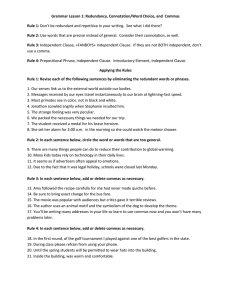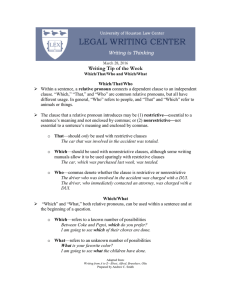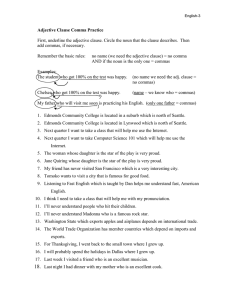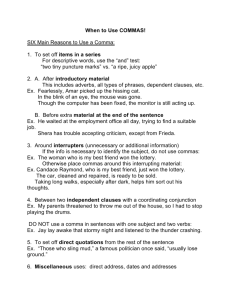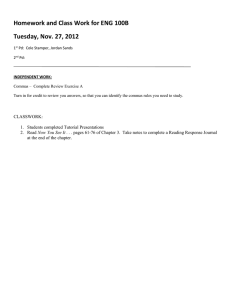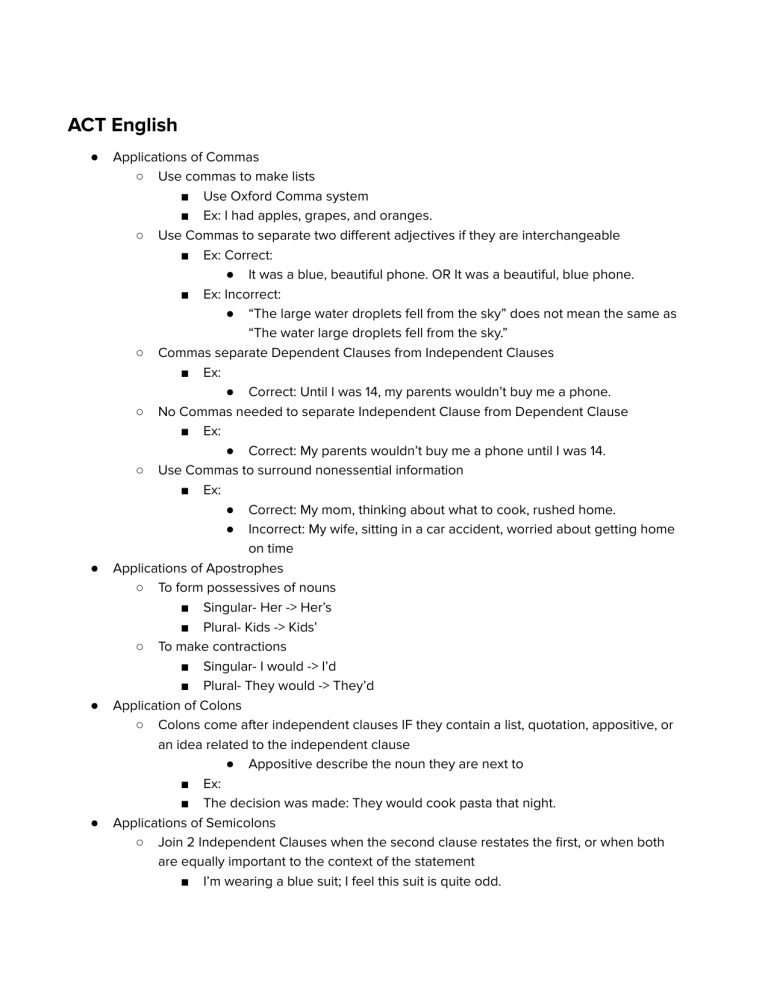
ACT English ● ● ● ● Applications of Commas ○ Use commas to make lists ■ Use Oxford Comma system ■ Ex: I had apples, grapes, and oranges. ○ Use Commas to separate two different adjectives if they are interchangeable ■ Ex: Correct: ● It was a blue, beautiful phone. OR It was a beautiful, blue phone. ■ Ex: Incorrect: ● “The large water droplets fell from the sky” does not mean the same as “The water large droplets fell from the sky.” ○ Commas separate Dependent Clauses from Independent Clauses ■ Ex: ● Correct: Until I was 14, my parents wouldn’t buy me a phone. ○ No Commas needed to separate Independent Clause from Dependent Clause ■ Ex: ● Correct: My parents wouldn’t buy me a phone until I was 14. ○ Use Commas to surround nonessential information ■ Ex: ● Correct: My mom, thinking about what to cook, rushed home. ● Incorrect: My wife, sitting in a car accident, worried about getting home on time Applications of Apostrophes ○ To form possessives of nouns ■ Singular- Her -> Her’s ■ Plural- Kids -> Kids’ ○ To make contractions ■ Singular- I would -> I’d ■ Plural- They would -> They’d Application of Colons ○ Colons come after independent clauses IF they contain a list, quotation, appositive, or an idea related to the independent clause ● Appositive describe the noun they are next to ■ Ex: ■ The decision was made: They would cook pasta that night. Applications of Semicolons ○ Join 2 Independent Clauses when the second clause restates the first, or when both are equally important to the context of the statement ■ I’m wearing a blue suit; I feel this suit is quite odd. ○ ● ● ● ● Join 2 independent clauses when the second clause begins with an adverb or transition ■ My mom said to clean my room; however, I proceeded to play video games and ignore her. ■ I played lots of madden; in fact, I beat every level in the game. Dashes ○ Used to emphasize a certain detail, they are more emphasizing than parentheses ■ I looked at my trophies- all 21 of them- and decided to buy a shelf. Application of Pronouns ○ Object Pronouns get verbed ■ Me, you, him, her, it ○ Subject Pronouns do the verbing ■ I, you, he, she, it ■ Example for both: ● Object- The waiter asked my parents and me about our order. ● Subject- My friend and I went to the park. ○ That vs Who ■ Who is for people ● The dealer met with the client who was interested in buying a car. ■ That is for everything else ● He got the car from the company that he worked for 21 years at. ○ Pronoun Agreement ■ Keep your pronouns consistent throughout a sentence ● A person -> He or she ● Everyone -> he or she ■ Don’t use their in most situations of pronoun agreement ● Ex: Incorrect: Everyone has to work hard if they want good grades. ● Ex: Correct: Everyone has to work hard if he wants good grades. Application of Verbs ○ For Present Tense ■ Simple Present: They play. ■ Present Perfect: They have played. ○ For Past tense ■ Simple Past: They played. ■ Present Past: They had played. ○ For Future Tense: ■ Future: They will play. ■ Future Perfect: They will have played by then. Comparisons ○ When comparing two things ■ You say you like something more than the other. ● ● ● ■ You can also say, “He looks classier than the other one.” ○ When comparing three things ■ You say “Dogs are the cutest of all animals.” Sentence Fragments and Run-On Sentences ○ Sentence Fragments ■ Must be preceded by or followed by an independent clause ■ Definition: Anything less of an independent clause. ■ Ex: Incorrect: Until the head of the college did something. ■ Ex: Correct: The students protested until the head of the college did something. ○ Run-Ons ■ Can Use Commas and a conjunction ● My favorite food is Italian food, as it has exquisite taste. ■ Can use Semi Colons ● I built a paper model; I’ve built many paper models. ■ Can use And or because ● Correct: My computer is fast because it has a fast chip. ● Incorrect: My computer is fast, it has a fast chip. Parallel Construction ○ Phrase things in a list all in the same way ○ Incorrect: The family drove to the mall, arrived at the store, and looked to find a computer. ○ Correct: The family drove to the mall, arrived at the store, and found a computer. Modifiers ○ Dangling Modifiers ■ Dangling modifiers begin a sentence, has a comma after it, and has the noun it describes NOT next to the comma ■ THESE ARE NOT CORRECT ■ Ex: Covering the bread, the family gasped at the mold ○ Misplaced Modifier ■ Misplaced Modifier are not close enough to the noun that they describe ■ THESE AREN’T CORRECT TOO ■ Ex: The computer was silver on the table ACT Reading ● Plan out according to time ○ Should spend max of 9 minutes on each passage ○ Feel free to come back to the two passage section and skip ● ● ● When words are mentioned in a question, scan for those words in the text ○ Key words: dates, names, verbs ○ The answer will likely be right in that area Keep relationships and dates in mind PASSAGE SPECIFIC TIPS ● Natural Science ○ Skim the passage, make a note off to the side about what each paragraph focuses on ○ Questions will be very content-centric, mark paragraphs with their focus ○ Mark definitions and data- those can be tested on in Natural Science Section ○ Don’t worry about science knowledge ● Literary Narrative ○ Don’t get caught up in understanding hidden meanings ○ Read through the passage, absorb the information ■ Questions will likely test you on events that occurred, no need for interpretation ○ If it feels wordy, come back to it later ● Humanities ■ Shortest of all of them usually ■ Read closely, this section tests more on things like: ● Characteristics of the character ● Events in the character’s life ■ Will contain answers that are mentioned elsewhere in the text ■ Can take up a lot of time if you don’t properly read the first time; Don’t feel the need to skim. ○ Social Science ■ THIS ONE HAS TWO PASSAGES ■ Read the first one first, answer all the relevant questions, then read the second one ■ Can take a lot of time ■ DON’T SKIM- You will get ideas mixed between the two ■ Give each passage a solid 2-3 minutes of reading/understanding ACT Math ● ● ● Plug and Chug in calculator On word problems, make sure you are putting the right values in the calculator Speed through the first 30 problems ○ If you get stuck, skip and come back ● ● ● ● ● ● From question 50 and on, use answer E or K when in doubt! Draw diagram if needed- GO WITH YOUR GUT ON HARD PROBLEMS If one question is hard even in the second half, don’t spend too much time on it ○ Losing one question is better than losing multiple When checking work, go from beginning to end, do the math for each problem Observe key terms in the problem, like ‘NOT’ or ‘negative’ Calculator is God
